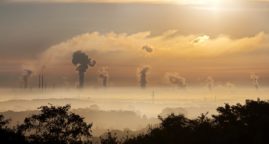Record support for advancing Paris Climate Agreement
In an extraordinary show of support for the Paris climate agreement adopted last December, 175 countries signed the Paris Agreement at a ceremony at UN Headquarters today that far exceeded the historical record for first-day signatures to an international agreement.
The ceremony, held the first day the Paris Agreement was open for signature, marked the initial step toward ensuring the agreement enters into force. The agreement can enter into force 30 days after 55 countries accounting for 55 per cent of global emissions deposit their instruments of ratification.
“The world will have met the requirement needed for the Paris Agreement to enter into force,” said United Nations Secretary-General Ban Ki-moon, “if all 175 countries that have signed today take the next step at the national level and join the Agreement.”
Fifteen countries submitted their ratifications during the signing ceremony, including small island developing countries that are on the frontlines of climate impacts.
Several countries announced plans to join the agreement in 2016, including Australia, Argentina, Cameroon, Canada, China, France, Mali, Mexico, Philippines, and the United States. Other countries, including Brazil, the European Union, and the Russian Federation, pledged to swiftly work to complete the necessary steps for joining the agreement.
“I am very pleased to see so much support and political momentum to move the Agreement forward,” said the Secretary-General. “The spirit of multilateralism is strong.”
He added that the participation by so many countries today, and the attendance by 55 world leaders, along with leaders from civil society and the private sector, leaves no doubt that the world is determined to take climate action.
There was strong business engagement at the Signature Ceremony, and United Nations Global Compact Executive Director Lise Kingo called on companies around the world to set an internal carbon price at a minimum of $100 per metric ton over time.
“The Paris Agreement sends a clear signal that business and investors must put climate at the heart of decision-making,” said Ms. Kingo. “We believe that setting a $100 internal price on carbon is one of the most effective ways to drive climate deep into corporate strategy and investment. While leading companies have taken steps to price carbon, we need to see an ascent in ambition and price across the board.”
Christiana Figueres, Executive Secretary of the UN Framework Convention on Climate Change (UNFCCC), said: “Today is a remarkable, record-breaking day in the history of international cooperation on climate change and a sustainable future for billions of people alive today and those to come.”
Figueres added, “The urgency now is to implement the Paris Agreement’s visionary pathways at a speed and scale that can deliver the next crucial steps; namely a swift peaking of global emissions, a climate neutral world in the second half of the century and the building of resilient countries and communities for every man, woman and child.”
The Paris Agreement marked a watershed moment in taking action on climate change. After years of negotiation, countries agreed to limit global temperature rise to well below 2 degrees Celsius, while pursuing efforts to keep temperature rise to 1.5 degrees.
Even as the agreement was adopted, countries recognized that present pledges to reduce emissions were still insufficient to reach these goals. The Paris Agreement mandates regular meetings every five years, starting in 2018, to review progress, and to consider whether it is necessary to increase ambition.
To go further
-> Record support for advancing Paris Climate Agreement entry into force
-> A new sustainable development agenda
-> A global agreement on climate change
-> 17 Goals to transform our world
Related Articles
One year after the earthquake in Nepal
04/16/2016. Malteser International plans construction of medical facilities in outlying regions
New study reveals increasing threats of cumulative climate hazards around the world
12/19/2018. This research reveals that societies face a much larger threat from climate change than previous studies have suggested.
When life hangs by a glass of drinking water
03/22/2016. The ravages of unsafe water are unexpected.






